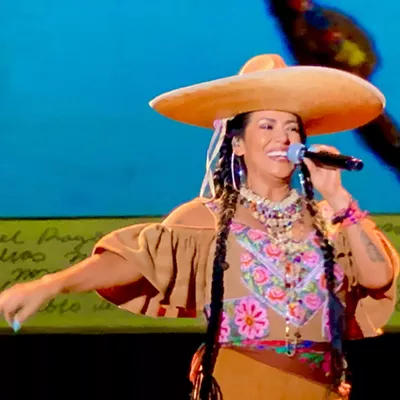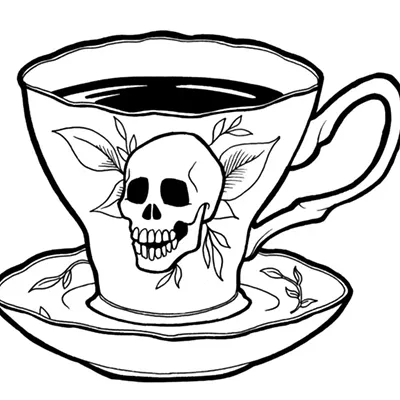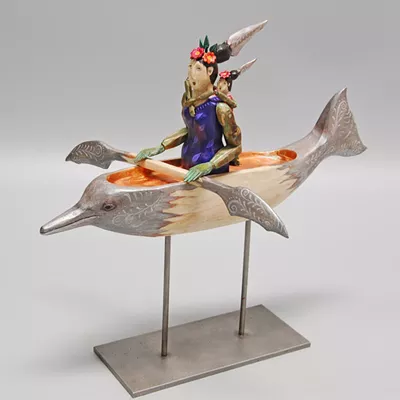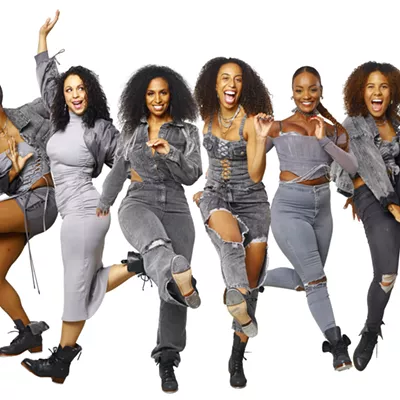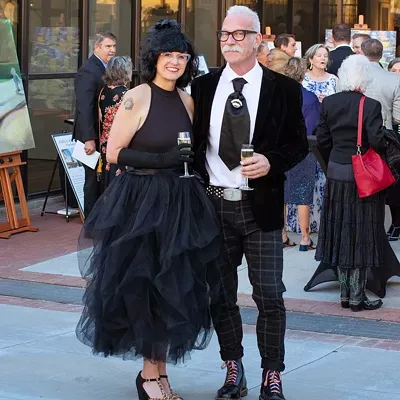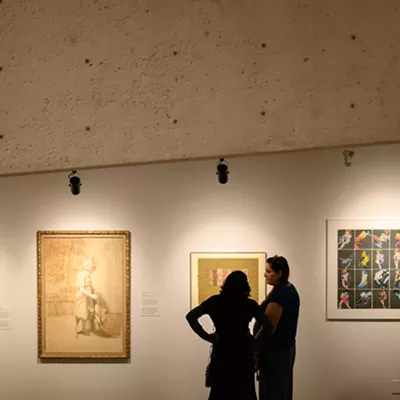Although Matt Baldoni's training was in classical and jazz guitar, he's a rock 'n' roll guy through and through. He has been playing professionally, often as a sideman, since his late teens. In fact, he was in the orchestra pit so much that he stopped shaving and getting his hair cut because his appearance wasn't a problem.
But his hairy head turned out to be a blessing when he was asked to audition for The Australian Bee Gees Show, which will set up shop next week in Centennial Hall, compliments of Broadway in Tucson.
"I guess I looked the part," Baldoni said in a phone interview from his home in Las Vegas. So for the last 18 months, he's been Barry Gibb in the touring tribute show.
We know the Bee Gees—the disco guys, right? Saturday Night Fever and such. Well, unless you are a huge fan, perhaps you didn't know that the group, consisting of brothers Maurice, Robin and Barry Gibb, was formed in 1958. And although there were various stages in their four-plus decades of making music, they are among the best-selling acts of all time, with more than 220 million records sold. Their unique sound featured tight harmonies and Barry's falsetto, and they wrote all their own material, plus hundreds of songs for other artists. Their songs and sound are deeply embedded in our music sensibility.
This touring version is an outgrowth of The Australian Bee Gees Show, which originated in Melbourne 17 years ago. "It's had a Las Vegas company now for a little over three years, and when they hired me I was the first American," Baldoni says.
Baldoni explains the history of this tribute show. "They performed their first hotel engagement in Hong Kong not long after they formed the group, and it was sold out for weeks. So they wanted to keep going, and now all these years they still have the same cast, which is rare."
Baldoni says that most tribute artists think that Las Vegas is the ultimate place to be.
"In that area, the tribute show, the best ones are here. So they got themselves here and opened a show at the Excalibur Hotel, which is still there running six, maybe seven nights a week year-round. But they had all these international contacts that they wanted to keep so they decided it was time to put together a second cast, and that's when they got me."
The Bee Gees were actually still touring and recording when the Australian show was born. So how did they feel about the tribute band? Did they approve?
"These tribute shows really can't happen legally without a certain amount of permission," Baldoni says. "These artists also make money from the tribute shows. The guys couldn't have sustained this for 17 years, and I certainly wouldn't have kept my job in this kind of capacity unless we were all treating it as a tribute that was respectful and authentic and not some sort of joke."
The show we'll see here is different from the Las Vegas show, Baldoni says. "In Las Vegas the show is more intimate. The one you'll see in Tucson is a much larger production. There are set changes and period-correct costume changes. It's an entire gigantic multimedia event with video segments that tie in to the events occurring when these songs were hit records, and a crazy amount of lighting and special effects."
Baldoni became familiar with the Bee Gees when he was a kid, after his mother introduced him to her collection of LPs. But when he became serious about a career in music, "I realized that the Bee Gees material was something that every professional musician had to know something about.
"I had no idea of the depth of their artistry until I was put in the professional position of having to learn an entire show's worth of their music. The Bee Gees and their music have changed my life."
Baldoni says that the physical demands of performing seven or eight times a week, especially with the demands of singing in falsetto (he's a natural baritone) has meant taking better care of himself—no smoking, no drinking, getting enough sleep and staying in shape. It's necessary, he says, because he wants "to maintain a respectful and authentic portrayal of this man.
"I want to be here a long time. I like this music. I like how audiences connect with Bee Gees music, and I feel very privileged that I get to do that for them in some small way. This (experience) has taught me, really, about music and being a musician, because one thing that separates the Bee Gees from a lot of other groups is that they wrote all of their own songs; they played all of their own instruments—they did everything themselves. That requires a huge amount of talent. Having that legacy as an influence on my own personal musicianship—I'd say is the way it's changed my life the most."
Baldoni says the Bee Gees appeal is timeless, not just for those who lived through the decades in which they were so popular.
"I was in the produce section store in the grocery store yesterday and I—you know, this beard and hair thing is a part of my costume that I can't take off—and this gal came up to me, she was in her early 20s, who said, 'Excuse me, are you the guy from the Bee Gees show?' And I said, yeah, that's me. She said, 'My mom dragged me to that show, and I never thought in a million years that I would become a fan of that kind of music, but you guys blew my mind.'
"Wow!" Baldoni says. "What a great testament to the brothers Gibb."

